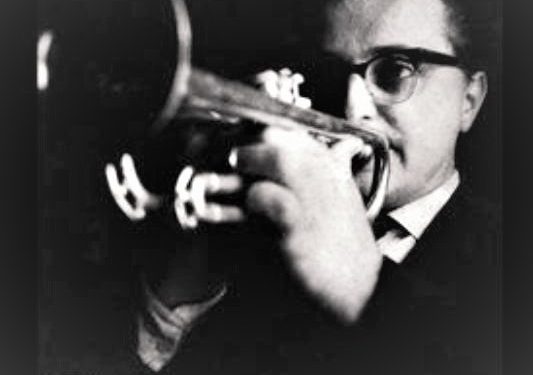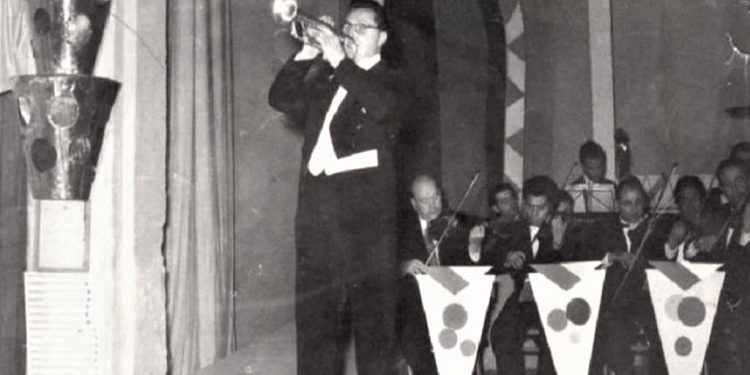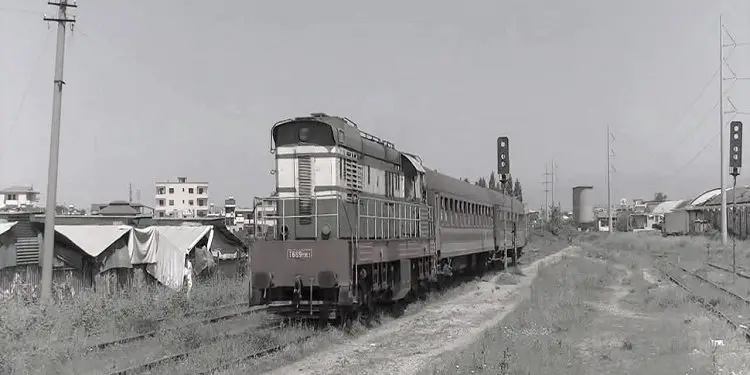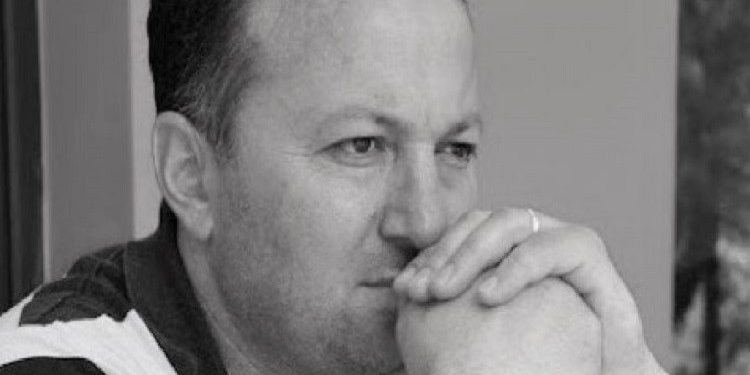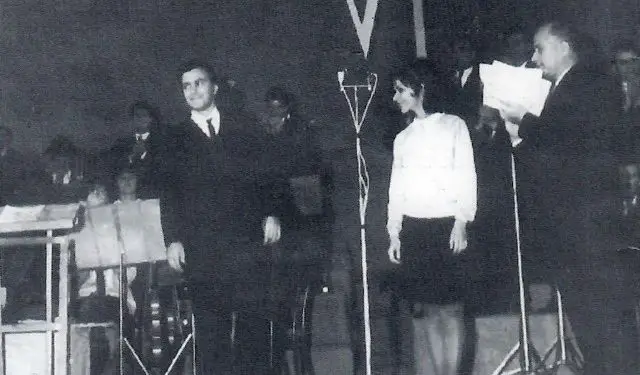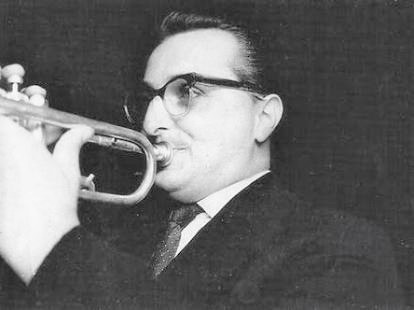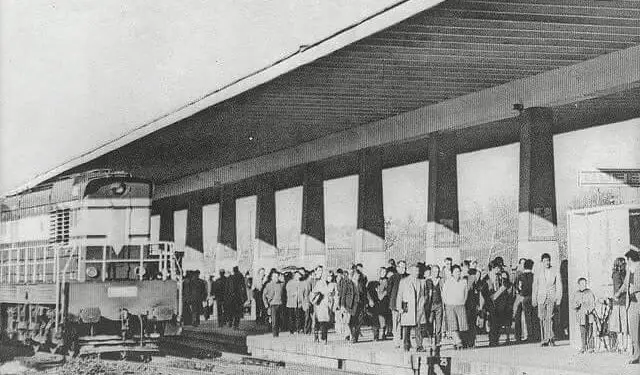By Ferdinand Dervish
The third part
Continues from last issue
Memorie.al / In the last two issues, we made a complete overview of the sensational event of the years 1984-1985, of the forgery of train tickets, by two different groups. According to the investigation and trial documents, the fake tickets, which had been on the market for a year, were dictated by two ticket clerks of the Shkodra line. Further, the police arrested a train ticket seller at the Tirana station, named Bukurie Gjeçi. Immediately after the police investigation, two groups of counterfeiters were set up.
One was led by the famous ex-musician, Gasper Çurçia, the other by the engineer of the General Directorate of Posts, Shkëlzen Doçi. Both groups were lured into this risky game by the saleswoman, who, since 1973, had put her hands in the cash register, causing a deficit of nearly 2 million old leks.
According to the accounts of the court’s experts, the big crook, Gasper Çurçia, was the third in the list of beneficiaries from the sale of fake tickets, with 40 thousand new ALL, while the largest amount, of 215 thousand ALL, was embezzled from the seller Bukurie Gjeçi, while the second in line was the engineer, Shkëlzen Doçi, with 116,000 ALL profit.
Many of us have a life event that sets them apart. An event that remains deep, resistant to any kind of brainwashing, and that haunts you for life. That you are fanned even in your sleep, that you are transported in a dream in the most incredible versions, that makes you the protagonist, makes you feel guilty without being such that forces the soul to crawl, to be against and to protest until nausea, which adds to your nightmares and makes you wake up terrified…!
This impression remains in the mind after the almost two-hour meeting with a former employee of the justice system during the communist era, who participated in the shooting of the two protagonists of the famous theft, by forging train tickets. An event that shook Tirana quite a bit in 1985, although precisely at the same time, Enver Hoxha, the communist dictator of the Albanians, died, causing an even bigger and more eclipsing noise.
The man in front of us, who, at the time we met him, had just passed sixty, was a pensioner, suffered from heart troubles, and began to tell us how once, during the dictatorship, he was paid to prove the iniquities and crimes of the so-called people. And it is precisely one of those who have the name and signature, finally, a record dated April 9, 1985, which proves the shooting of musician Gasper Çurçia, postal engineer Shkëlzen Doçi, both of the ticket forgery file as well as a another prisoner, convicted of murder.
The sixty-year-old took the road that led to a quiet bar somewhere behind “Hotel Tirana”, whose choice seemed to be related to the fact that it was frequented by people of the same age. It seems that the man, who resisted until the end not being a named protagonist in this writing, felt warmer, more comfortable, among old acquaintances. He begins to get into the topic only after taking the first sip of coffee, mixed with a little sugar.
“It was April 1985. It was freezing. It is not remembered that a cold like that happened again. Maybe also for this reason, a day later, Enver Hoxha would die. I don’t mistake the time because this is the most serious, most terrible event of my entire life. It was a period when Albanians were desperate for a living and the system became very aggressive in punishments for any kind of theft. That’s why they sentenced them to death, these train ticket holders.
As far as I remember, the theft of money, if it exceeded a certain amount, if I’m not mistaken, 70 thousand old ALL, the Criminal Code of the time, punished with prison, which went up to death. So these poor people went to the bullet. I will not forget the last words of Gasper Çurçi, before the shooting, when he said that they were killing him for 20 thousand ALL, but the younger one, Shkëlzen Doçi, made a bigger impression on me. They killed him for nothing…”, began to tell us, the man who seemed to be still feeding himself and placing this event, outside or above his former duty, in a not a little important link of the communist state.
Moreover, everything started and finished at night, under the dim light of hand-held flashlights. At night, to be enveloped even more by the enigmas. But also thankfully at night, to give way to some vision of those that the overworked mind sometimes brings, that to find a little rest it separates, puts it on the upper shelves of the warehouse, where all the not real are stacked, all untruths, all that we usually call figments of the imagination.
“To tell the truth, those two hours spent at night, somewhere near Linza, at the foot of the Dajt Mountain, on the change of dates April 9 and 10, 1985, apart from leaving me in a psychological shock for the next 15 days, they tired me throughout the following life. In fact, I am convinced that even this event must have had an impact on the ruined health…”!
A contested mission
The man, who confessed to us, seemed to be one of those who have been badly burned by following, without thinking twice, the dictated routine. This is what happens with human beings, when they feel comfortable in a task where, they realize too late, they have rushed to become the protagonists. In a task that has to do with interfering in the lives of others, or with the very existence of these lives.
When, because of their status, they place themselves away from the majority, above it, in the role of shepherds, watchmen, controllers, judges, judges and finally, when there is no more time, when they do not immediately understand what they are undertaking, when they don’t even have power, because everything is dictated by many levels above them, they accept, even with an aggressive increase in restraint, the role of executors. So the self-judgment about this situation, captured decades, becomes heavy.
“The issue of forging train tickets was not mine. He was investigated, taking him to court, by the mayor, S. Baboçi. It was April 9, 1985, when the chief gathered us and informed us that one of the staff should be present at the shooting of two convicts for forging train tickets, as well as a third. According to a regulation, in such cases there should have been a representative of the prosecution, a man who fulfilled the presence of the state. When the boss saw that no one was volunteering, he pointed the finger at me.
At first, it seemed to me that he was joking, because I had him or considered him a friend, because it seemed to me that we had mutual respect for each other. Immediately afterwards, I got upset and asked him to change his decision, saying that I didn’t have the heart to see such scenes. But the boss, for whom I still have respect, did not budge from his. To tell you the truth, what I was asked to do seemed difficult to me, but if I had known what it would really cause me, I might have objected to the point of changing the course of events. Even if he takes the consequences on his shoulders”!
That same day, according to the character in question, a decision of the Presidium of the People’s Assembly arrived at the Prosecutor’s Office of Tirana, dated April 8, 1985, which stated that; the three convicts, an ordinary murderer, Gasper Çurçi and Shkëlzen Doçi, were not spared their lives. So the executions, according to a now old rule, had to be done the next day, April 9, 1985, in the presence of a team composed of; the head of the police force, an investigator, a prosecutor, a doctor and a secretary, who had to record everything in a record, especially the last word of the condemned, before the shooting, a mandatory formality.
“As we had agreed before, I was taken by car somewhere at the intersection of “Pharmacy no. 10″. I remember I froze from the cold, waiting. There were several cars, while in one of them, which I was told was armored, the three convicts were kept. It was about 23:00 on April 9, 1985, and when I passed by the car, which seemed to me to be armored, I heard heavy sighs, the same ones that still haunt me in my dreams. I didn’t know before, because I hadn’t even had the chance to be told about similar stories, that they were the sighs of souls who felt that a few minutes later, they would be shot…”!
To the common grave…!
“The cars started going up the Dajti road and I noticed that everyone in the cab did not speak. Only the driver smoked a cigarette and shook the ashes out of the half-open window. I remember that in those days, it was snowing. Or I’m wrong. Also, I’m not exact, but it seems to me that someone whispered that one of the convicts had a birthday. After reaching Linz, the cars drove into the yard of the Security Battalion, drove the entire length of it, and finally stopped.
Further, a piece of road had to be made on foot. I remember that the ground was rising. We started to climb the row, one after the other, with slow steps, as the convicts, whose hands were tied, could barely take the steps. Surely their blood had begun to poison, to become numb, from the thought that, a few minutes later, they would be shot to death.
At one point, we stopped about 100-150 meters up, near a large open pit. It must have been the middle of the night when we started the proceedings. I remember that we did not see any gravediggers nearby, only armed policemen. The common grave was opened during the day. Those of the escort platoon, who apparently did not have it the first time, sat the convicts on the ground, with their feet hanging down in the pit. The upper side of the grave was the bench, the last chair where they sat…”!
The former civil servant rested for a while and again filled the glass with water, with a trembling hand. As for the coffee, he had taken out the bottom, with three turned.
“At this time, I heard for the first time the voice of Gasper Çurçi. He addressed that convicted murderer, who was crying and begging us for mercy all the time. There was a boy from the north, who had killed a citizen, to rob him of three hundred ALL. The event took place in a small hotel in the center of Tirana. “Vjosa”, make no mistake. Gasper told him; in short, that there was no more time for prayer and mercy, because everything was over, it was decided. I remember that he used some phrases, like; “Come on, man, enough nonsense… this work is over…” And surprisingly, the word made room for him, as the other didn’t open his mouth again.
At this time, the procedure carried out in the dark, under the limited light of hand-held electricians, provided for the introduction of a representative of the prosecution. Of the man who had to follow and guarantee what was called the will of the state.
“It was my turn. Before the convicts said their wishes and last words, I had to communicate to them the decision, or rather not to change the decision of the shooting penalty, by the Presidium of the People’s Assembly. In those times, after the courts decided on executions, the convicts had a last chance to be pardoned by the Presidium of the Assembly. But he had not forgiven these blacks.
As far as I remember, he only forgave the woman involved in the network, the one who sold the fake tickets…”, explained the man in front of him, ordering another glass of water, with pieces of ice. The waiter, who seemed to know him, did not delay. Meanwhile, the other resumed the lecture: “To mark the last word, but also to draw up the entire minutes, there was also a secretary, D. Mata, with us.
I remember that, he wrote by illuminating the paper with a lantern. I also remember that, it was very accurate. The day after, when he brought me the typed record for signature, I saw that not a single letter had changed from the last word of the convicts. Let’s go back to where we left off. With the help of a flashlight, I read the decision of the Presidium of the People’s Assembly to the convicts. I remember that the paper began to shake in my hand, that I felt bad and that I tightened my muscles, but without any noticeable change. Next, I asked them to say their last wish…”!
“When we exhumed my father’s remains, we saw that he had been tied up with wire”
“The pit was dug in a place with pumice that had well preserved the corpses…”! One of the family members of the musician Gasper Çurçia, shot after being accused of forging train tickets, claims that, after the overthrow of the dictatorship, it was not easy for them to go to the grave of their loved one. Seven years later, in 1992, with the support of an authorized police officer, Gasper Çurçi’s sons left no stone unturned to find their father’s remains.
“At that time, many people were looking for their relatives who were shot and it happened that, after discovering the graves, in the absence of experts, they took the wrong bones with them. But luck helped us”, one of the sons of the talented musician told us. According to him, once, someone had given them accurate information about his father’s burial place and they had left together with the police officer charged with that task. The corpses were found exactly where the information said, about 150 meters above the former ward of the Security Battalion, near Linza.
“We started digging and I remember someone told us that pumice preserves corpses better. But I could not mistake my father’s remains even though the grave was shared. I remember that, as soon as we came across the bones, we worked carefully, cleaning the whole place, in order not to mess up even a particle of them. I had taken my father to prison, that beige woolen blouse, with which you also presented him in the newspaper, these last days, I even knew well his cloth pants, the shoes, which he made to order, because there was a bump on the side, the thumb, the glasses…! That’s why we weren’t wrong”, confesses one of the sons of the musician Çurçia.
And according to him, his father’s bones were undamaged, even inserted inside the woolen blouse and fabric pants, these also almost undamaged. “Only the places where the pants were sewn, it looks like they were made of cotton, were rotten and worn, but the rest of the clothes were undamaged. But the bones of the other two gunmen were also compact. I remember that we also took the remains of Shkëlzen Doçi with us and gave them to the family members”, one of the sons of the musician Çurçia told us, adding that what remained in his mind the most was the fact that in the grave, next to the corpses, they had found pieces of wire.
“They were pieces of wire no longer than 40-50 centimeters, which were clearly used to tie the convicts before they were shot. It was understood that they had squeezed between them round shapes, which are obtained from the wrists. This wire connection of the convicts is inhumane, but at least, after they had been killed, they had taken it away”, Gasper Çurçia’s son concluded his story. Memorie.al
The next issue follows




